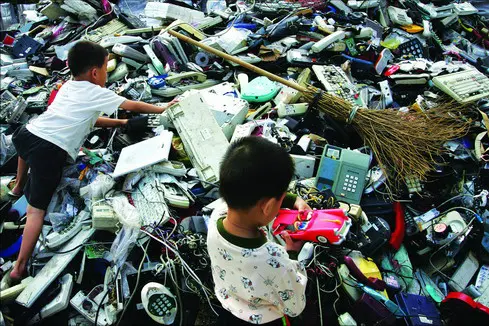The government of a southern Chinese town famous for processing electronic trash has ordered all recycling firms to move by the end of the year to an industrial park designed to cut pollution.
Guiyu, in Guangdong Province, has been laid waste by its recycling businesses. Scrap is heaped up in front of houses. The town is suffocated by smog. Its putrid river stinks.
Opened in 2013, the suburban industrial park offers emissions reduction services and standardized disposal of effluent and trash. Hazardous waste is banned there.
More than 400 large workshops in the center of town had been closed by the end of November, but that still left more than 3,000, according to Lin Dingliang, head of Chaoyang District of Shantou City, which administers Guiyu.
Guiyu began recycling electronic trash in the 1980s. Today, 100,000 people are employed to dismantle 450,000 tonnes of computers, televisions and so forth each year. The thousands of small workshops have taken a terrible toll on local soil, water and air.
"The river used to be strongly acidic, and copper levels in the riverbed sludge were almost on a par with copper mines," said Huang Tengyuan, director of Shantou's environmental protection bureau. There have been noticeable improvements since recyclers began to move to the park two years ago.
Compared with 2012 levels, the heavy metal content in Guiyu's air declined by 94 percent in the first three quarters of this year, while lead, nickel and copper content in the river dropped by 37 percent, 78 percent and 94 percent, respectively.
The relocation, however, has not gone entirely smoothly, with business owners complaining about rising costs.
"It costs almost twice as much to rent a workshop in the park as outside, and there are more transportation fees," said an owner surnamed Chen.
Profits are also falling due to the declining price of copper. "The price has dropped from 80,000 yuan (about 12,500 U.S.dollars) per tonne to 30,000 yuan, and many people have already left the business," Chen added.
Researchers from the environmental science research institute of Sun Yat-Sen University in Guangdong have suggested that more favorable policies and better services would encourage people to move to the park.
But according to Huang, even after all recycling firms are relocated, that won't be an end to the problems.
"Policing outside the park needs to be tough to enforce the ban and the pollution control technology inside needs to be improved," he said. "Controlling pollution in the town is going to cost billions and we have a long way to go."
 简体中文
简体中文

